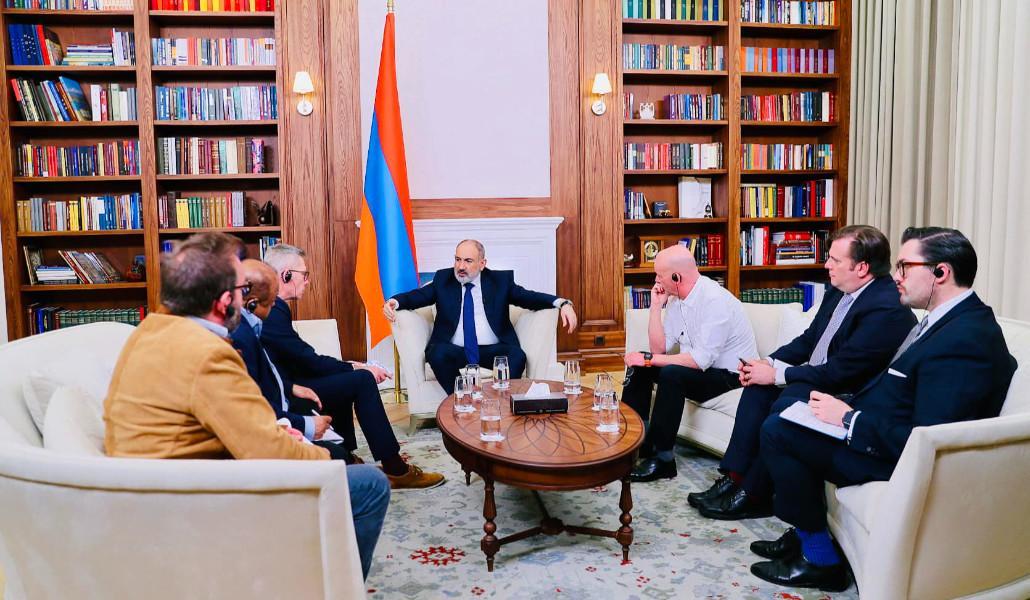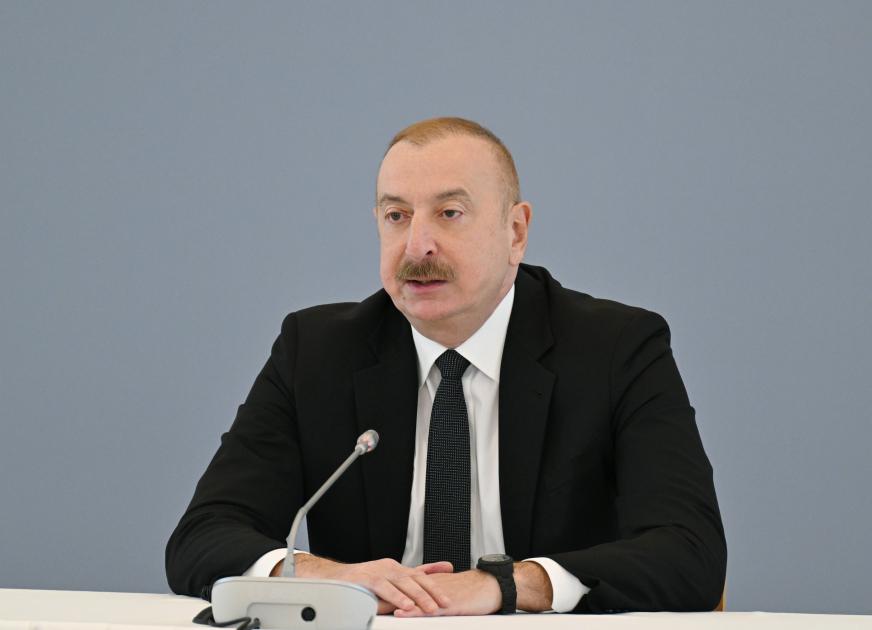Armenia strengthening sovereignty by normalising ties with Azerbaijan Analytics by Serhey Bohdan
Armenian Prime Minister Nikol Pashinyan discussed Armenia’s withdrawal from the Collective Security Treaty Organisation (CSTO) with Western journalists again on April 22, which is linked to Russia.
CSTO Secretary General Imangali Tasmagambetov responded that although relations between the CSTO and Armenia are not good now, the Armenian side is working in the CSTO, and all issues are being resolved as usual.
The Armenian leadership continues working in all spheres at once in its foreign relations. However, Yerevan’s foreign policy combination to save its expansionist project has not fully worked. As a result, Armenia had to begin demarcating the border with Azerbaijan.
Messengers from London
The Armenian leader gave a very unusual interview to UK’s journalists and lobbyists at the beginning of the week. It is unusual because the radical statements of UK’s journalists turned out to be at least as interesting as Pashinyan’s restrained answers.
The guests represented major media outlets and lobbying groups closely associated with the UK’s establishment. They arrived in Yerevan deliberately as part of London’s complex political game. Their offensive tone during the conversation was obvious.
Guardian journalist Patrick Wintour started acting energetically and described Pashinyan as modern-day “Prester John”.
This image of a desperately brave ruler of a distant Christian country suffering from the tyranny of barbarian infidel neighbours was used for centuries by Western invaders who committed massacre and plundered non-European peoples under the sign of the cross.
“You have recently lost a war. You are taking a big risk in trying to get closer to the West. Do not you worry about the consequences? May Armenia join the EU in the next decade?” Wintour asked.
Kim Sengupta, the representative of the left-liberal Independent, began to hint that modern liberal representatives of the West could help their distant brother.
However, his words had the opposite impression. Some gentlemen in London would like to use Armenia as a tool to obtain profitable contracts in Azerbaijan.
“British Petroleum has supplied oil and gas from Azerbaijan worth $35 billion over the past four years. This is by four times more than Azerbaijan's growing defence budget,” Sengupta said.
“Thus, the UK has certain leverage over Azerbaijan through British Petroleum. Would you like the UK to use this leverage? Azerbaijan receives numerous weapons from Russia, Türkiye, Israel. Armenia receives some weapons from India and France. Would you like other countries to intervene the process for Armenia to receive the weapons to defend itself?” Sengupta added.

While answering the questions, Pashinyan was restraint to all provocations. Then a Telegraph journalist asked a question.
“Your current security system is not effective. The CSTO did not help Armenia during the recent conflict with Azerbaijan. How will these relations develop in the future? What benefits will membership in the CSTO bring to Armenia? Will the Russian military bases remain in your country?”
In response, Pashinyan said that the CSTO allegedly had treacherously broken its promises and as if it had not said that it would only defend the clearly determined borders of Armenia, and would not fight for the results of the territorial seizures of Armenian nationalists and the unclear borders of Armenia.
In the end, Pashinyan still had to declare that he does not understand why the Armenians are still in the CSTO, and the government is under pressure from the public demanding a withdrawal from the CSTO.
A representative of an ultra-neoliberal lobbying group, the Adam Smith Institute, also asked a question.
“Are the Azerbaijanis or even the Russians sincere in their desire to normalise relations, or are they simply preparing the ground for further hostile or aggressive actions?”
After one more, the only neutral question in the entire interview, the conversation was ended by BBC journalist Giles Fraser who raised the topic with which the interview began - Pashinyan as a modern “Prester John”.
Fraser touched upon the Christian theme. This time he, rather than the Armenian interlocutor, retold the common cliche about Armenia as the oldest Christian country in the world.
“Can you describe the ongoing destruction of churches, crosses, and tombstones?” Fraser said.
However, the Armenian leader again refused to comment on the topic.
Rivalry with Rwanda for the illegal migrant market
Armenian leaders are so cautious because they doubt their Western idols. As for the funds, Yerevan has so far received the minimum from the West.
In fact, Armenia is now competing with Rwanda for the opportunity to create concentration centres (or camps) for illegal refugees who have made their way to the UK.
On April 23, the UK’s authorities offered to deport these poor guys to Africa, but the Rwandan option is considered risky due to the country's notoriety after the recent genocide, as well as numerous cases of torture and murder committed by its security forces.
In general, Armenia has a chance to beat Rwanda as a safer place. Of course, such prospects look dubious, and therefore Yerevan’s elites do not intend to abandon their much more serious relations with Russia, and if they have to do this, they refuse at the minimum level.
The press secretary of the Russian president announced on April 22 a possible imminent meeting between President Putin and Pashinyan. He emphasised that only the withdrawal of Russian border guards, rather than the withdrawal of Russian troops would be discussed.
The Armenian prime minister said that Armenian border guards would replace their Russian colleagues on the northern section of the border with Azerbaijan as soon as it was delimited. Azerbaijan insisted on proceeding with delimitation while Yerevan preferred to maintain uncertainty on the border.
Pashinyan himself admitted in March that he was faced with the prospect of either returning the Azerbaijani lands or fighting.
The Armenian government chose the first and agreed by mid-May to delimit the border as a whole, carry out demarcation in one of the areas and returned the occupied villages to Azerbaijan.
Delimitation of the border on April 23 was launched from the section between Azerbaijani Gazakh district and Armenian Tavush district (Tovuzgala). The delimitation commissions worked there for a month, but the first pillar was installed only when Baku raised this issue.
The determination of the border line caused Armenian nationalists’ violent reaction. This is paradoxical, because one of the results of these changes in relations between the two neighbouring countries was that the borders of Armenia are finally guarded by Armenians, rather than by the troops of an allied, foreign country. The Azerbaijani position resulted in strengthening of Armenia’s sovereignty!
New order in the South Caucasus
Yerevan’s “ridiculous war” with Moscow—a combination of anti-Russian rhetoric with minimal practical changes in policy reflects the weakness of the Armenian establishment, which lacks the resources to take a more independent position and is ready to take advantage of a small opportunity to advance its interests.
It is tempting for Armenia, as a small country, to follow the example of other similar countries and for a moment to appear in the big league of world politics through participation in the confrontation between the West and the Russian Federation.
For this purpose, there is no need to rush to leave the CSTO, the Eurasian Economic Union (EAEU) and other organisations associated with the Russian Federation. Pashinyan will be able to sell his services to the West, while at the same time selling other product to Moscow - hopes of preserving the union with Armenia.
However, Pashinyan can no longer use the “Russian trump card” against his neighbours in the Caucasus because the Azerbaijani government is consistently depriving him of the corresponding opportunities rather than because he abandoned it himself, attracted by Euro-Atlantic ideals.
For example, as a result of Baku's policy aimed at normalising the situation in the region, last week Russia began to withdraw its peacekeeping forces from Azerbaijan’s Karabakh region.
Pro-Armenian circles in Russia expected that they would remain there until 2025 upon the corresponding agreement. Moreover, the possible participation of these forces in demining the region was discussed.
After the withdrawal of these forces, the Armenian side lost even the theoretical possibility of using Russian soldiers to return to Azerbaijan’s Karabakh on its own terms. Apparently Yerevan hoped for this.
It became finally clear that return is possible only under the conditions that were initially voiced by the Azerbaijani authorities - that is, former residents of the Karabakh region who lived in it legally can return there, observing the procedures provided for by Azerbaijani legislation.
Such structural changes in the geopolitical configuration of the region and the balance of power in it entailed transformation of other political and strategic processes.
Yerevan has finally discovered something in common with Baku and, on April 23, President Aliyev noted that “Azerbaijan and Armenia already understand what a peace agreement should look like. We just need to work out the details”.

Indeed, without outside interference, Azerbaijan and Armenia, as well as the rest regional countries, begin to negotiate, following a pragmatic approach.
Turkish President Recep Tayyip Erdogan noted that a new order is being formed in the South Caucasus, and he hopes that this will push Armenia to take the right path in relations with Türkiye.
Indeed, Pashinyan has signaled a willingness to seek the ways to improve relations with Ankara by his recent remarks regarding the events of the World War I.
Of course, the situation in the region remains dangerous as external forces who want to intervene in the processes in the Caucasus have completely different interests. This was obvious in Pashinyan’s conversation with the UK’s representatives.
By the way, this interview was made on the eve of UK’s Foreign Secretary’s trip to Central Asia - and it is obvious that to implement any serious projects with these countries, the UK’s side will need Azerbaijan’s involvement.
In the current situation, there are no other ways for the West to enter this region except through Baku. The UK became interested in Yerevan as a tool to put pressure on Baku.
The fate of Armenia depends on the position of the Armenian leaders. Are they ready to break ridiculous historical taboos and live in peace with their neighbours or do they want to continue ideologically motivated confrontation, chasing the mirage of Western help and intrigue against neighbours in the interests of distant empires?
History is full of examples of how Armenians successfully developed cooperation with neighbouring Turkic and Muslim peoples. Let us remember the relations of the Armenian population and the representatives of the Armenian church with the Azerbaijani rulers of the biggest Safavid state in the history of Azerbaijan, or the activity of Dashnaks in the parliament of the Azerbaijan Democratic Republic.
As for hope for the Western help, the Armenians themselves were repeatedly disappointed by the reluctance of distant empires to “save” Armenia.
Pashinyan could have learned from the fresh experience of pro-Western Iranian liberals, who since the late 1990s, following approximately the same ideological principles as Pashinyan (according to which any movement towards the West is good for any people), have been trying to agree with the West on some “deal". This resulted in the complete collapse of the liberal wing and numerous problems in Iran itself.
The views and opinions expressed by the hired political analysts in their articles may differ and do not always reflect the views of Caliber.Az.








